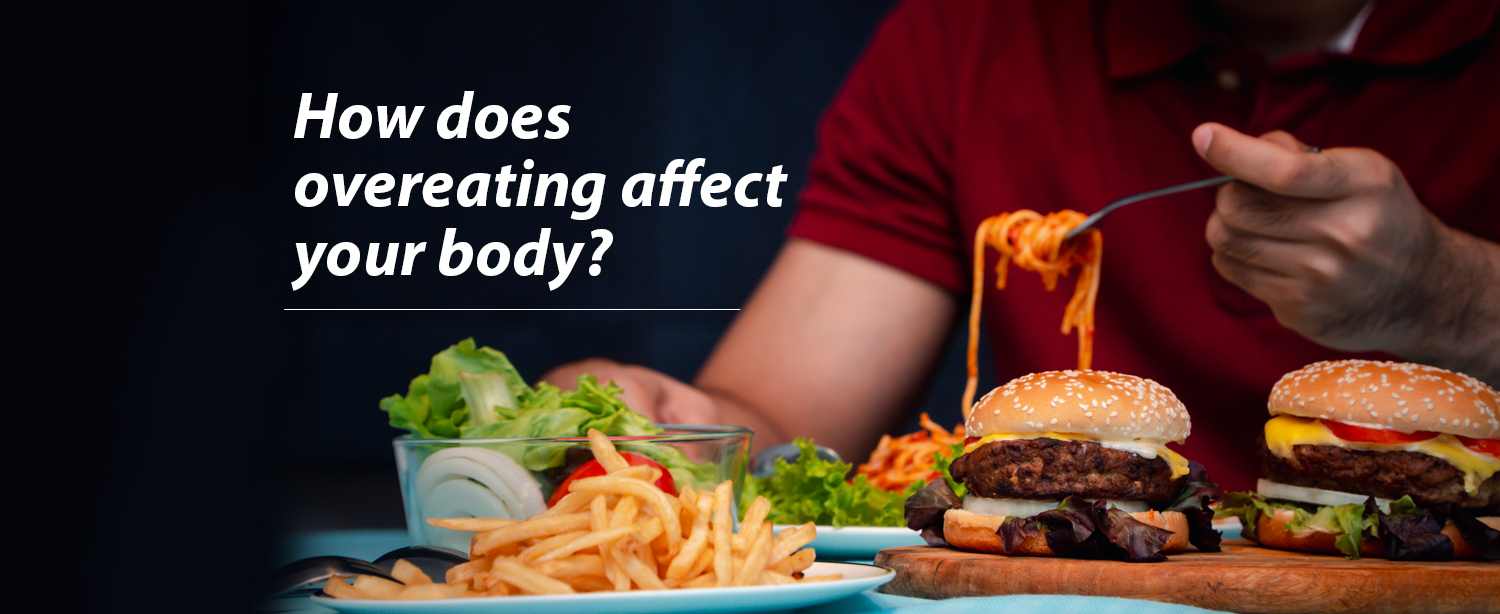Cannot stop munching on that pack of chips? Love bingeing on your favourite gulab jamuns? Do you love indulging in your favourite cuisines? Be it a celebration or a regular day do you tend to overeat often? Overeating has both short-term and long-term health repercussions. Despite the fact that it makes you feel even worse later, people also use food to deal with stress and other unpleasant feelings. Even though it may seem like you’re caught in a never-ending cycle, binge eating disorder is curable. You may learn to regulate your eating and form a positive connection with food with the correct guidance and support.
When you frequently take more calories than your body requires to maintain normal physical function, it is a sign of an overeating habit. The habit does not, however, develop overnight. People who struggle with overeating frequently engage in the behaviour on several occasions. Over a period of time this can damage your health.
What happens when you overeat?
The signal from your brain informing your stomach that you are full takes around 20 minutes to reach your stomach. When you consume food after you reach this stage of fullness, you are overeating. A heavy meal can have both short-term and long-term effects on your organs, weight, and sleep. Find out what really happens to your body when you overeat:
- Overeating causes the stomach to expand beyond its normal size to accommodate the excess food. This discomfort can make you feel tired, sluggish or drowsy.
- Your organs must work harder when you eat too much.
- The stomach secretes hydrochloric acid to digest food. Heartburn may arise from this acid backing up into the oesophagus after an excessive meal.
- Your stomach may also produce gas, leaving you with pain, discomfort and a full feeling.
Dangers of overeating
When you eat a lot, you end up with a heavy, sore, stuffed belly. Everybody experiences this occasionally. Large calorie intake is exhibited by individuals with binge eating disorders. That may completely wreck your system. The way the body functions is altered by this eating disorder. Here are a few long-term physical effects of binge eating disorder.
- Weight gain
When you binge eat, you frequently gain weight. Overweight people make about two thirds of patients with the disease. When you eat a lot of food quickly and don’t work off the calories through exercise, you may gain excess weight. Being overweight or obese also increases your risk of several chronic diseases. - Heart disease
Your heart has to work harder to pump blood to your body and lungs if you are overweight. High blood pressure, excessive cholesterol, and high blood sugar are all risks associated with being overweight, especially in the area around the abdomen. Your risk of heart attack and stroke is increased by all of these factors. - Type 2 Diabetes
Type 2 diabetes is more likely to occur in overweight people than in other people. That happens when your body is unable to produce or utilize insulin sufficiently to maintain a healthy level of blood sugar. Type 2 diabetes can result from binge eating disorder. - Depression
People with binge eating disorders are more likely to experience depression and anxiety. Many individuals who binge eat do it to elevate their mood. This might make you feel guilty and encourage further bingeing. - Sleep problems
Research shows people with binge eating disorder are more likely than others to have trouble sleeping and suffer from sleep apnea. This sleep condition causes you to have frequent pauses while breathing. - Joint problems
Your joints can be harmed by the extra weight brought on by binge eating disorder. It might result in osteoarthritis. Your joints’ cartilage starts to erode at that point. Any joint, including the fingers, hips, and knees, may experience this. - Fertility and pregnancy problems
Binge eating disorder can also impact your fertility. Instead of following a normal cycle, periods might be erratic. During pregnancy, overweight women are more likely to suffer from high blood pressure and high blood sugar, both of which are harmful to the mother and the unborn child.
Smart ways to avoid overeating
While everyone may feel tempted occasionally, here are some simple yet effective tips to stay away from overeating:
- Pay attention to your portion sizes.
- Avoid processed and deep-fried foods.
- Eat more salads and stir fries.
- Eat fresh fruits as snacks.
- Avoid distractions when you eat, such as watching screens or talking on the phone.
- Eat slowly and chew your food well.
- Stay hydrated.
- Plan your meals ahead.
If you are suffering from an eating disorder or are overweight or obese, we highly recommend meeting our dieticians at the Department of Nutrition Therapy. A personalized diet plan is very helpful in correcting your eating habits and will help improve your health. Please find below the website link for more details: https://www.kokilabenhospital.com/departments/clinicaldepartments/nutritiontherapy.html


